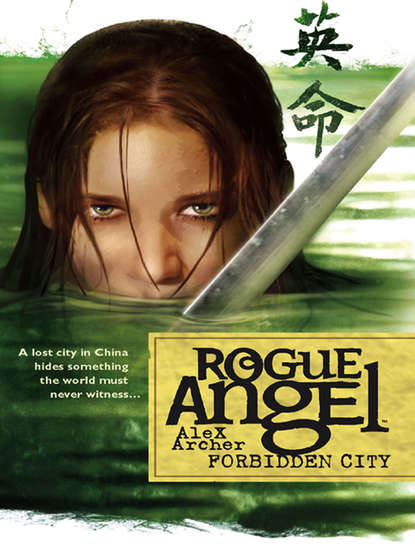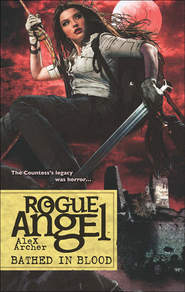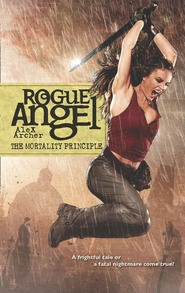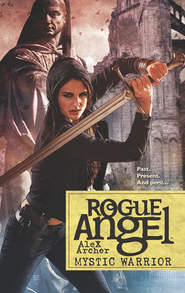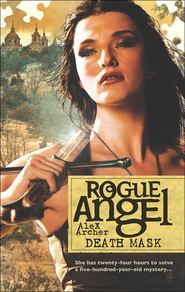По всем вопросам обращайтесь на: info@litportal.ru
(©) 2003-2024.
✖
Forbidden City
Автор
Год написания книги
2019
Настройки чтения
Размер шрифта
Высота строк
Поля
“If we were just going off the journal you found, maybe it would be. Fortunately the California Historical Society, as well as dozens of other branches and genealogists in the area, collected stories, journals, and newspapers.”
“I trust your expertise in this matter.” Huangfu smiled. “That’s why I hoped you would help me.”
Annja slid out of her backpack and placed it beside the nearest building. The wind picked up and caused the branches to rattle against the roof. No trace of paint remained on the weathered boards. It was possible the exterior of the building had never been painted.
Working quickly, she paced off the dimensions of the buildings. Most of them appeared to have been constructed roughly the same. She guessed that the building she was searching for would be similar. When she finished, she returned to the backpack.
Huangfu didn’t say a word.
Crouching, her back against the building, she took a bound journal from the backpack, as well as two energy bars, offering one of them to Huangfu. The man took the snack and crouched beside her.
“What’s that?” He pointed at the book.
“A journal I made for the search we’re going to conduct here.”
The journal contained hand-drawn maps Annja had created from topographical surveys she’d found of the Volcanoville area, as well as ones she’d found in newspapers and letters collected in the historical societies she’d visited. Tabs separated sections on known facts, rumors, and stories she’d gleaned from her research. All of the notes were handwritten, and she’d made the sketches, as well.
“You have maps?” Huangfu sounded doubtful.
“I made them, based on geological surveys of the area, as well as stories I found. The forest and the stream, they’re there in the right places. The map of the town is purely guesswork.”
“I thought you’d arrived in Georgetown only this morning.”
“I did.” Annja smiled at him. “The Internet is a wonderful tool.”
“You do this for all of your projects?”
“When I can. I like to have an idea of what I’m getting into before I arrive. Usually time at dig sites is limited. You have to know what you’re looking for and where to look for it. Not all nations welcome archaeologists with open arms.” Annja flipped through the maps she’d created. “A lot of that has to do with the fact that in the early twentieth century a number of archaeologists served as spies for the Western world.”
Huangfu laughed. “Have you ever been a spy, Miss Creed?”
“No,” Annja said flatly.
“Would you be one if you were asked?”
“I guess it would depend on the circumstances. That’s not what I’m about. I’m an archaeologist.” Annja looked around at the buildings, trying to see through the present into the past that had existed over a hundred years ago.
Huangfu drank water from his canteen and sat silently. From the man’s relaxed posture, Annja believed he could have sat that way for hours. She hadn’t yet gotten a fix on him and that left her feeling a little unsettled.
When she’d first connected with Huangfu over the Internet and then the phone, Annja had guessed he was a corporate worker. But from the money involved in his quest—and the fact that he’d generously arranged her flight out and her bed-and-breakfast accommodations in Georgetown—she’d figured he was near the top tier. A background check on him had confirmed that Huangfu Cao worked for Ngai Enterprises, a Shanghai-based international pharmaceutical company.
Bart McGilley, the New York homicide detective who was one of Annja’s closest friends and who had done the background check on Huangfu, had wanted to dig deeper. But Bart tended to be overly protective where Annja was concerned. She hadn’t wanted to wait any longer. Huangfu had volunteered to pay her expenses, and he’d said he only had the next few days to attempt to locate his ancestor’s remains. She’d assumed he’d taken leave to attend to the matter.
Annja was all too aware that her own free time turned on a dime and was often gone before she knew it. She’d already turned down a Chasing History’s Monsters assignment to track down the legend of a vampire living in Cleveland. Vampires were perennial ratings winners on the television show, and her producer, Doug Morrell, had a special interest in them that she hadn’t quite figured out. Given her options, she’d jumped at the free trip to California.
Within minutes, Annja found the few remaining landmarks she’d identified from the stories and the geographical maps. Once she was oriented, she grabbed the straps of her backpack, hoisting it to one shoulder.
“Let’s go,” she said.
Huangfu fell into step beside her. “Do you know where the building we’re looking for is located?”
“I think so.” Annja pointed. “Chinatown was up on that ridgeline. Mining towns were usually segregated by race. Chinese immigrants poured into California in the 1850s and 1860s.”
“For the promise of gold. I know.”
“Not just for the promise of gold.” Annja started up the incline, grabbing an exposed tree root as she leaned into the ascent. “They were also escaping the Taiping Rebellion that occurred after the British defeated the Chinese in both Opium Wars to force British trade.”
“I’ll take your word for that, Miss Creed.”
Annja was surprised that Huangfu wouldn’t know that. Those times had been hard on the Chinese people. The British had usurped the emperor’s control and spread opium throughout Shanghai and other provinces through gunboat diplomacy.
The Chinese had invented gunpowder for fireworks, and had even used it somewhat for cannon and flamethrowers, but they had never mounted cannons on ships for use in war. The British had done that with success unmatched by any other nation.
Reaching the summit of the rise, Annja looked down, orienting herself again. She tried to imagine what the town had been like when it had been booming with the promise of gold. In San Francisco, which had been in its infancy when the Gold Rush had started, sailors had abandoned ships and left them sitting crewless in the harbor, chasing after the elusive promise of sudden wealth. Only later, after some of the prospectors had struck it rich and others had returned looking for work, had San Francisco grown into a huge port city.
Men had lived and fought, chased possibilities, drowned sorrows and died in a microcosm fuelled by dreams. Annja felt the history almost come alive around her.
She relished opportunities to go places and see them for herself. She’d never been to an abandoned mining town before. Even though it was only a hundred and fifty years old, not centuries or a millennia as many of her studies were, the history of the place touched her more than she thought it would.
She let go of the city and focused on the man she’d come there to find. She turned to face Huangfu.
“Your ancestor, Ban Zexu, arrived in San Francisco in 1872. I confirmed your research with my own. Most of the Gold Rush was over by 1855, but several strikes kept happening. Some of them took place here in Volcanoville.” Annja walked west along the ridgeline, seeing the layout of the buildings in her mind’s eye.
Huangfu followed her.
“He lived up here in Chinatown, overlooking Volcanoville proper. The Chinese immigrants weren’t allowed to mix with the white population.”
“But the shopkeepers took their gold for things they needed,” Huangfu said.
Annja nodded. “All of these towns were violent. Too many men were looking for too little gold, which had gotten harder and harder to find. In 1874, Chinese miners found a ten-ounce nugget at the Cooley Mine. Drunken miners locked over a dozen Chinese in the cabin at the mine and burned it to the ground with them inside. The men who escaped the fire were gunned down.”
“Was that where my ancestor was murdered?”
“No.” Annja walked along, studying the ground. “Ban Zexu was killed here. A few of the buildings in Volcanoville had root cellars where they kept potatoes and other perishable goods. Fewer still of the Chinese structures up here did. Your ancestor died in a house two houses down from one of the houses that had a root cellar made of rock according to the information I was able to find.”
Dropping her backpack to one side, Annja reached inside and took out an Army surplus trenching tool that snapped together and a metal rod with a handle. She pulled on a pair of leather work gloves.
“First we’ll find the stone foundation of the root cellar, then we’ll find the house where Ban Zexu died.”
She thrust the metal into the thick loam and got started, searching for stone. Thankfully, the early spring thaw had left the ground soft and easy to work. She only hoped the root cellar had truly been made of stone and wasn’t too deep to reach with the tools she was using.
I T TOOK LESS THAN AN HOUR to find the root cellar. Stepping off the measurements of the house, assuming that the cellar was under the center of the building and was entered from the back, Annja quickly located the area where she believed the building Ban Zexu had been murdered in had once stood.
She had stripped off her fleece-lined coat, finding it too hot to work in. Huangfu had divested himself of his jacket.
“Make sure you get plenty of water.” Annja uncapped her canteen and drank. “Cold will leave you as dehydrated as heat.”
Huangfu nodded and drank. Despite his exertions, he didn’t look any the worse for wear. One of his shirt sleeves crept up and revealed the red, yellow and blue ink of a large tattoo. It had scales, so Annja guessed that it was a dragon or a fish. Self-consciously, he pulled his sleeve back down, looking at Annja.





